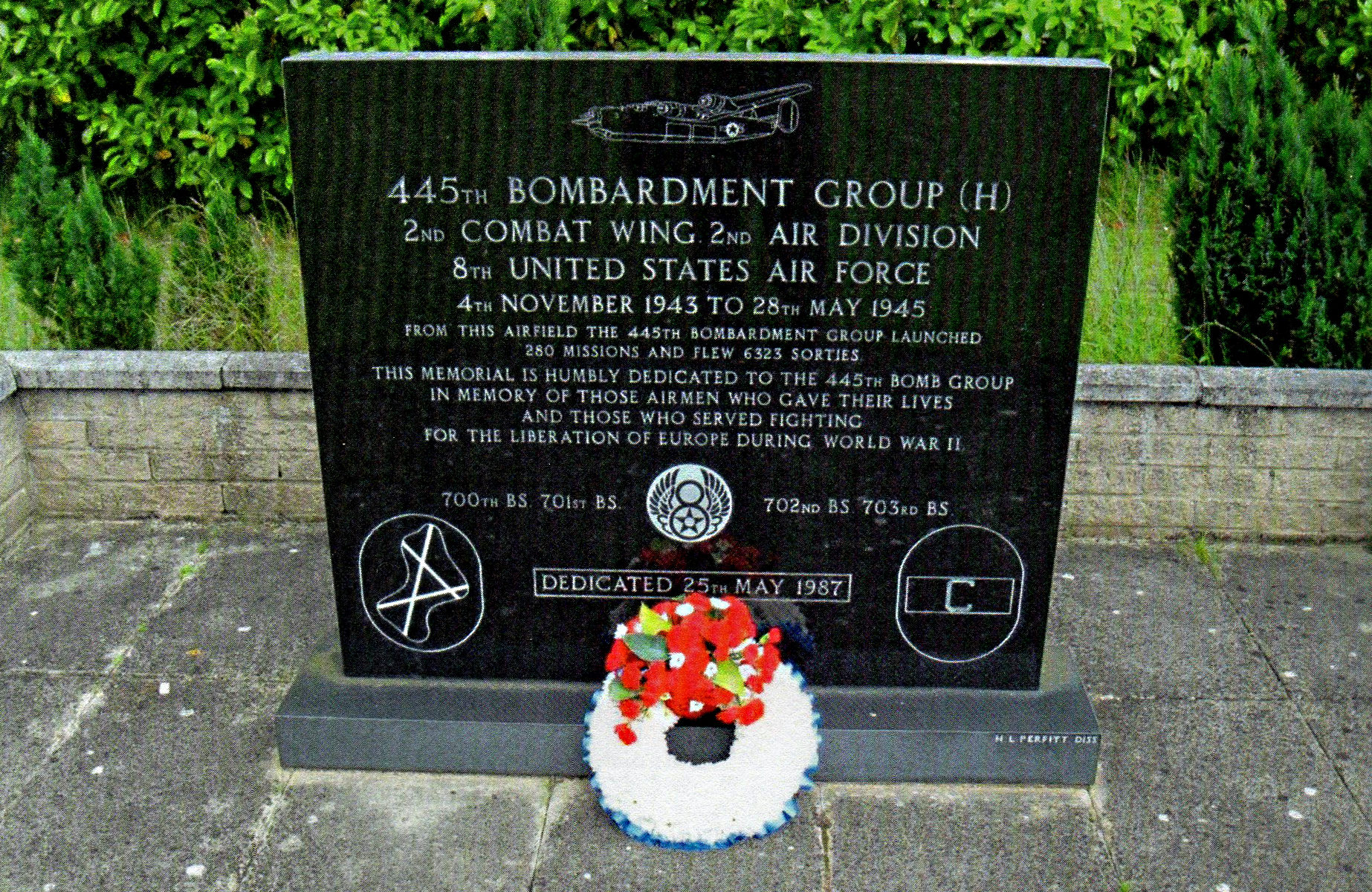An Account of Earl’s Last Days
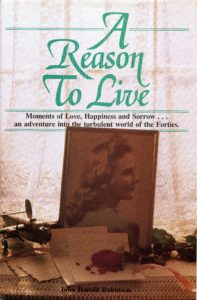
From A REASON TO LIVE by John Harold Robinson
The page header photo is of the marker at Tibenham Airfield, the current name of the place Earl was based. It is now an RAF base.
Note that I am putting all quotes from the book in a bold deep red color to distinguish from my words. And the page numbers are the pages in the hardback book for that quote.
After all of the training and traveling halfway around the world, the 445th Bomber Group was finally stationed at a base in England on a village air strip near the English Channel for easy access to Germany and France across the channel. They were at the village of Tivetshall on the air base now called Tibenham with the closest city by train being Norwich. The day after their first bombing mission this is recorded:
Day After First Bombing Mission
On the morning of December 14, we were still discussing the group’s first mission and the flak holes. Cross said, “Maybe if that is all the damage you get from flak, it will not be too bad.”
Wright came by and told us that they were giving overnight passes if we would like to go to Norwich, the closest town. We could get off the base for a while. This was the first pass to town that we had since we had arrived in England.
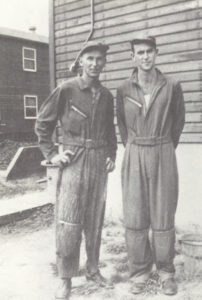
Earl Doggett, Cross and I dressed up in our best uniforms. We picked up our passes and walked to the little train station at Tivetshall and rode the train into the city of Norwich. When we arrived in Norwich there were American soldiers everywhere.
The three of us started walking the streets of Norwich, looking at all the small shops. We stopped at one little shop and bought some hot fish and chips, a handful of fried fish and a handful of fried potatoes lying on a piece of newspaper. Most of the English people were friendly but very cool toward the Americans. Some called us “Bloody Yanks,” which sounded kind of strange to us. The shop keepers would say, “Yea, Yank,” or “Yea, Bloody Yank.”
The money was something else. We knew a British pound was worth four dollars and three cents. It was just hard to keep up with a shilling, halfpenny, and pence. I would keep a handful of British change and when I wanted to pay for something I would take out the change and let the shop keeper pick out what he wanted. If he tried to take it all, then we would have to talk about it. (Page 177)
Well–it goes on like this for several pages about their first adventure into English culture. They see a live theater musical show which they did not understand, but while there met a nice Royal Air Force Major and his family who invited them to come visit their home sometime. It was much like most of us on our first visit to a new culture. It was 3 American GIs a long way from home: Earl Doggett, John Robinson and E.O. Cross having a little fun after their first scary and dangerous bombing mission over Germany.
Christmas Eve 1943
After a very successful bombing mission on the French coast line against a German rocket base that morning, they were ready to get into a little bit of Christmas spirit. They stole some sugar from the mess hall and:
At the hut we put the sugar in our steel helmets and then added the chocolate rations that we had been savings. Then with some water added, we put the helmet on the pot bellied stove and started cooking it. We had two full helmets of chocolate that we hoped we could cook down and make a lot of candy. The ration bars were about one inch by six inches and plenty strong. …It got hard pretty quick. We had more than enough for everyone in the hut.
Earl and Dewey made a Christmas tree out of sticks and coal. We all put paper and toilet paper on it to decorate it. “Damn if it don’t look like a Christmas tree,” Dabbs said. (p. 209)
Their Commander was Jimmy Stewart
I should say “Major Jimmy Stewart.” And yes, this is the famous, beloved movie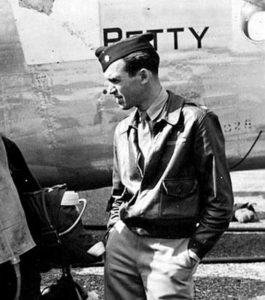 star. Throughout the book John speaks highly of him as “one of the guys” sometimes, but also serious and strict when he needed to be. Just one excerpt:
star. Throughout the book John speaks highly of him as “one of the guys” sometimes, but also serious and strict when he needed to be. Just one excerpt:
Major Stewart was leaning against the wheel and about to bump his head on the wing. He was so tall. He said, “Well, I guess you fellows can fly this thing. Let’s go back and get some coffee.” The truck came and Stewart got in the back end with us. Alexander sat in the front seat with the driver.
“These damned trucks ride just like a bucking horse,” Stewart said on the way back to operations. He seemed to be in better spirits. (p. 250)
NOTE: For more on Jimmy Stewart as their commander see: http://www.historynet.com/mr-stewart-goes-to-war.htm
January 21 and Earl Depressed?
The last mission that Group had put up was on January 21. Metcalf’s crew flew on it and Earl Doggett had been dragging around ever since he came from the flight. None of the crew had said much about the mission. We tried to get Earl to play cards with us. He said he didn’t want to. He just wanted to stay in his bunk. Someone said Earl had not received a letter from home in a long time. (p. 25)
January 29 Mishap and Thinking of God
Several squadrons flew on a mission today, but not Earl’s (Metcalf’s Crew) which stayed on the base. But one of the most horrible things for this group happened at the base that day. As several squadrons took off for their mission that morning two of the B-24s crashed into each other leaving a horrible mess at the base. That evening after the mission and John was in bed:
We were all asleep when Metcalf’s crew came roaring into the hut, waking us up. They had been in a briefing most of the day. Earl Doggett and Dewey were trying to tell us about pieces of the B-24s falling all over the base this morning. Even bodies coming down in parachutes from the cloud cover. Bombs going off in and near the ground crews barracks. Fragmentation bombs had fallen in one hut and killed several GIs.
…Doggett said, “Tomorrow is Sunday.” He sounded strange. Instinct made me open my eyes and look at him. I didn’t know one day from the next… Days were all the same. Always cold, damp, foggy, rainy….
It was Sunday, January 30. We spent the rest of the day playing cards. Doggett, Tyler, and I were playing Blackjack. Cook, Van Bogelen, Phillip Bronstein, Stanley Trouseh and James Crawford were in a big poker game. Poker was their thing.
The other two members of Metcalf’s crew stayed in their bunks most of the time. I guess we spent more time on our bunks than doing anything else. Just lying there and feeling sorry for ourselves. The bunk was the only home that we could call ours. No one invaded your bunk without a fight or fuss. That was private personal property.
Doggett said, “The chaplain is going to start a church service in the briefing room on Sunday morning. We should all find out about it.”
Doggett was from the Bible Belt in Arkansas and was a very religious young man. “Earl, maybe we can go next Sunday, if they have it. You can talk to the chaplain and find out about the service. They are going to build a chapel soon, the ground crew told me.”
When we quit playing cards, I noticed Doggett lying on his bunk, reading his little pocket Bible. …We never talked about religion among us but I noticed we all were thumbing the little pocket Bible more and more each night.
We knew we needed some kind of help. (p. 262)
February 1–A Formal Formation & Air Medals
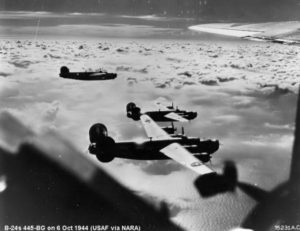 General Timberlake and Colonel Terrill showed up… “The 445th Group’s bombing record is becoming the very best in the Eighth Air Force.” Timberlake said.
General Timberlake and Colonel Terrill showed up… “The 445th Group’s bombing record is becoming the very best in the Eighth Air Force.” Timberlake said.
The general then called out our names individually and asked us to step forward. A citation was read and he pinned the Air Medal on each of us for completing five combat missions over Europe… The general had presented eighty-three Air Medals, one Cluster, and two Purple Hearts during the formation. (pp 262-263)
Doggett and I tried to play Blackjack for a while. I could tell that he was worrying about the mission they had to fly the next day. I said, “Earl, let’s take a walk.” We walked down to the mail room and back.
As Earl and I walked back from the mail room, he looked at me with tears in his eyes and said, “Robbie, I am really afraid today. I know I am going to die.”
“What makes you think that you are going to die?”
“I just know it.” he said.
“Earl,” I said, “I get scared as you do, but I am going to do everything I can to say alive. I am not going to give up. Earl, if you really expect to get killed, then you will because you will do something wrong. You don’t have to give up. There is always a way.”
We walked for a while without saying anything. We were about back to the hut when Earl said, “I don’t think God wants me to live.”
I said, “Earl. My God! What a thing to say. What is wrong with you?”
“I just have that feeling,” he said. “I can’t help it.”
As I lay on the bunk, trying to go to sleep that night, I couldn’t get my mind off what Earl had said. …My light was causing shadows on Metcalf’s side of the hut.
As I lay there watching the shadows, I looked at Bronstein sitting on his bunk. Then I looked Earl lying in his bunk. A sudden fear overcame me. The way the shadows were formed, they looked like death itself. I tried to get the thought out of my mind. When I looked again, there It was again, death sitting on Earl’s bunk.
I reached up on the shelf and got Elizabeth’s letters and started reading them. I got up and went to the latrine and came back, trying not to look at the Metcalf crew’s side of the hut. I turned my light off and crawled into the bunk between my ten blankets… It was a long night, lying there trying to get everything out of my mind. Sleep finally came over me. (pp 265-266)
The next thing I heard was the Jeep stopping in front of the hut. The sergeant came in and woke Metcalf’s crew…
Earl came by the foot of my bunk, reached over and put his hand on my blankets where my foot was, and left…
…The tower told us that of twenty-eight airplanes out, twenty-six had returned. They were still waiting for two to return.
We found out that the mission was to Sericourt, France. Cross said, “That is just over the French coast line. It’s not too bad a mission. Let’s go back to the hut. The other two planes will show up soon. Maybe they landed at another base.”
…I kept think about what Earl Doggett had told me. Could it be possible that he had a real premonition of what was coming?
We all went to the mess hall together. No one had much to say… Everyone was thinking about Metcalf’s crew. I wondered, “Are we here one minute, gone the next?”
We all walked on back to the hut. Everyone was making himself look busy… Wright and Bucky walked in… Wright said he had heard nothing from other air fields whee the two planes could have gone down. There were a few field yet to report in to Wing Headquarters.
“It is beginning to look bad,” Wright said.
Another night was spent lying on my cot, thinking about what Earl Doggett had said. I thought it had to be a lot of bunk: “No one knows when they are going to die. Or do they? Maybe Metcalf’s crew will get back tomorrow.” Then the thought of tomorrow’s mission began to creep into my mind. The butterflies were always there when I hear “Mission tomorrow.” (pp 266-268)
February 3–The Assumed Verdict
John’s crew flew their mission today and after returning safely and changing clothes in the locker room:
…We all walked by the operations at the tower and asked. The officer there told us that Metcalf’s plane had gone down in the ocean. The best that they had put together from the different crews that were flying with them was that Metcalf had gone down into a cloud layer on the way back from the target. He had never been seen again. “His plane just disappeared.” the officer said. “he was still over water when he was last seen.”
We all just stood there a minute and then walked out. Not one word was said. We walked on back to the hut together.
The blankets and covers were all rolled up on Metcalf’s crew’s side of the hut when we got back. All of their belongings were gone. It looked as though no one had ever been on that side of the hut. We all came in and went on our side of the hut and lay down on our bunks.
I don’t think I could have said anything without crying. I had to wipe the tears from my eyes as I lay there. We were all feeling the effects of losing them. It was like losing a big part of our family all at once.
I got up and put some coal in the pot bellied stove. I lay back down, thinking, “Could it really be possible that Earl knew he was going to go down?”
The thing was over my head, but that was what had happened. (pp 269-270)
All page numbers referenced are from the book A Reason to Live by John Harold Robinson, published 1988 by Castle Books of Memphis, Tennessee. John Harold Robinson, author of the book, died at the age of 90 on January 7, 2011.
My Postscript
Aunt Lois tells me that John wrote at least one letter to Earl’s mother (my grandmother) after Earl’s death. Some of the family wanted to believe that he went down behind enemy lines and was captured. He would be rescued later. But I believe that the above account by John Robinson is probably about as accurate an account as we will get and that Earl is a hero buried in the ocean, the English Channel.
J.C. told me his name is on a plaque posted somewhere near where the base was located. It is my hope to go there someday to experience the place, photograph the plaque and surroundings, walk through Tivetshall and ride the train to Norwich. As I think of this story I am still almost overcome with emotion. It is like the feeling I have when I walk out of an emotional movie or leave the funeral of someone close. I’m speechless. What kind of a life and family would Earl have had? What would he be like if here today? Of course we will never know. We can only cherish the memories and the stories of a remarkable young man who sacrificed his life for many of the freedoms we enjoy today.
–Charlie Doggett


